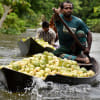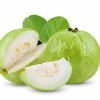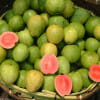Guava season aiding economic growth in south

With the guava season now in full swing, farmers and traders in southern Bangladesh are busy harvesting and selling the fruit from various orchards in the region.
After visiting Banaripara upazila of Barishal, Jhalakathi sadar upazila, and Nesarabad upazila of Pirojpur, it was seen that local markets are packed to the rafters with fresh green guava.
Besides, as much of the fruit is moved via inland waterways, floating guava markets can be found across each of the three districts.
These markets have become a tourist attraction over time, drawing in large crowds of foreign and domestic travellers this time each year.
Guava is being cultivated on 24,588 hectares of land across Barishal division to produce 25,000 tonnes of the fruit worth more than Tk 25 crore, according to the Department of Agricultural Extension (DAE).
And thanks to improved road connectivity due to the opening of Padma Bridge, guava produced in the region can now quickly reach different parts of the country, including Dhaka.
As such, at least 100 to 150 tonnes of guava worth Tk 10-15 lakh are transported to different markets by trucks and trawlers every day.
Additionally, the arrival of nearly 5,000 tourists every week is helping develop the local economy.

For example, several guava parks and hospitality services, such as restaurants, have been established to cater to travellers, local farmers said.
According to DAE officials, Nesarabad upazila contributed a majority of the guava grown in the three southern districts.
Some 835 hectares were cultivated in Nesarabad upazila to produce 7,656 tonnes of guava this year.
Meanwhile, the guava acreage in Jhalakathi sadar upazila and Banaripara was 591 hectares and 210 hectares respectively.
Apart from commercial purposes, almost every house in the region has some form of guava cultivation for personal consumption.
Mizanur Rahman, a guava wholesaler in Kirtipasha union of Jhalakathi, has been shipping at least 200 tonnes of guava to markets in Shariatpur every day since the harvesting period began.
"I have been buying guava for about Tk 350 per maund [37 kilogrammes]. Farmers are getting good prices this year due to the improved communication system," he said.
Rahman had purchased the fruit from farmers for Tk 300 per maund last year.
Chapal Krishna Nath, agriculture officer of Nesarabad upazila, said the amount of guava being sent to Dhaka has increased this year thanks to the improved communication system.
Ali Ahmed, agriculture officer of Jhalakathi sadar upazila, said there are around 2,000 guava farmers in Jhalakathi while the three districts combined house some 10,000 people involved with the business.
Minati Samaddar, a guava farmer of Bhimruli village in Jhalakathi, said he leased 62 decimals of guava farms for Tk 22,000.
Having collected about 50 maunds of guava so far, he is now selling the fruit at local markets.
And although guava yields were slightly less this year due to drought, farmers are pleased with the current market price.
Shekhar Sikder, another local guava farmer, said although cooperative societies give them loans, farmers still lack access to bank finance.
"Farmers would be benefited if banks gave loans immediately at low interest rates," he added.
Saidur Rahman Rintu, president of the Barishal Chamber of Commerce and Industry, said the local economy would improve significantly if agro-processing industries were set up in the area.
"I call upon the traders to come forward in this regard," he added.

 For all latest news, follow The Daily Star's Google News channel.
For all latest news, follow The Daily Star's Google News channel. 








Comments